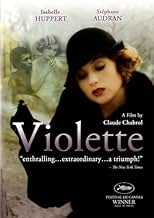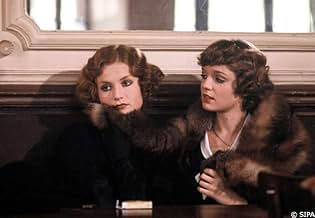Being one of two among Chabrol's own personal favorites (the other is LES BONNES FEMMES [1960]), I reserved its viewing on the director's 80th birthday. However, while certainly beautifully made and acted, I found myself not sharing Chabrol's enthusiasm for the film (though I did not go so far as to slap a measly ** to it as Leonard Maltin did!). In fact, it is also inferior to the later STORY OF WOMEN (1988) – which this fairly resembles (being similarly based on a factual cause celebre), particularly in its latter stages.
Incidentally, the film seems to have been made as part of a two-picture deal (along with BLOOD RELATIVES [1978]) between France and Canada. Anyway, it led 23-year old Isabelle Huppert (though the character she plays is actually only supposed to be either 14 or 18, depending on the sources!), an award winner at Cannes, towards acquiring the well-deserved status of her country's premiere actress she retains to this day.
Chabrol tackled melodrama only occasionally and seldom with success: on the one side, we can cite THE BREACH (1970) and the afore-mentioned STORY OF WOMEN (also with Huppert) and, among those that did not work out quite as well as had been anticipated, one can name – alongside the film under review – the somewhat unnecessary adaptation of MADAME BOVARY (1991; in which Huppert had the title role yet again). The problem here lies with the story itself (to escape her stifling petit bourgeois existence, a girl – whose promiscuity had already given her syphilis – poisons both her parents), which is simply not all that interesting
and, stretched to slightly over two hours, the effect rings even more hollow!
Still, to redress the balance, the film is imbued with the director's customary exactitude of period detail (it is set in the 1930s) and characterization (even if the protagonist hardly arouses our sympathy throughout, especially when accusing her late father of incestuous conduct to justify her own actions!) – but also unusually featuring a handful of quirky interpolated flashbacks. The strong supporting cast includes such Chabrol fixtures as Stephane Audran (at 45, heading definitely towards middle-aged roles though here she is still able to express her sexuality), Jean Carmet (by far his largest role for this director), Mario David and Bernadette Lafont (appearing towards the end as Violette's cellmate), as well as Francois Maistre (a Luis Bunuel regular) and Fabrice Luchini.



































